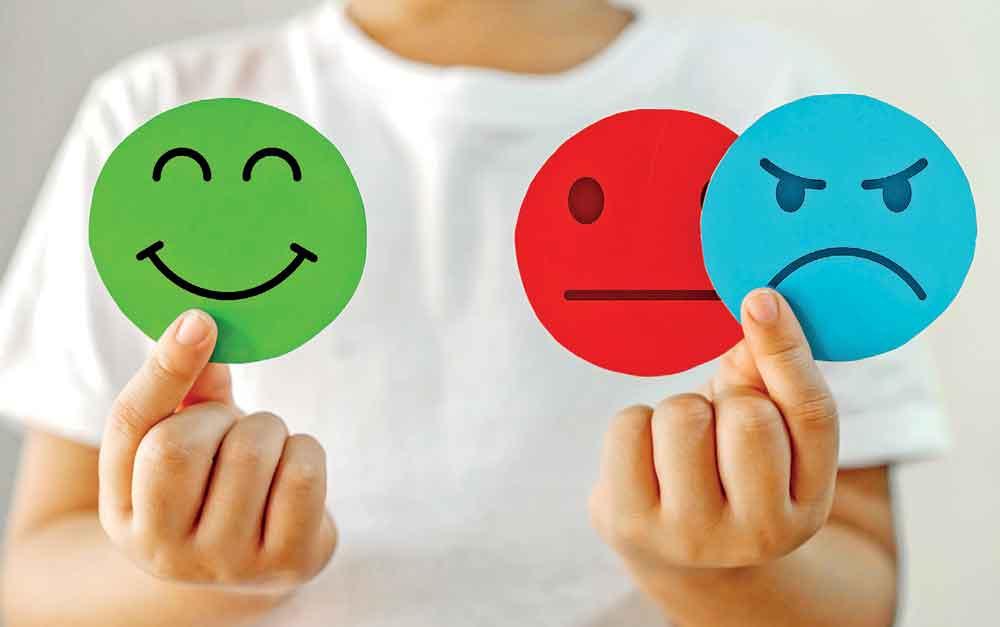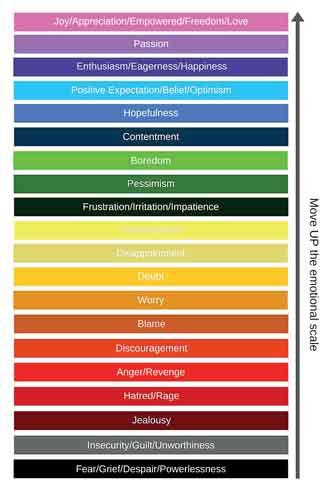28 Oct 2024 - {{hitsCtrl.values.hits}}

|
The emotional scale is a concept rooted in the understanding that emotions exist on a spectrum, ranging from the lowest, most negative feelings to the highest, most positive ones The emotional scale is not a fixed state, and that’s the beauty of it; while you may find yourself at a lower point on the scale from time to time, you have the ability to move upward, one small shift at a time |
 Have you ever noticed how a single thought or feeling can shift your entire day? One moment you’re feeling fine, but then an unexpected bill arrives, and suddenly, you’re overwhelmed by stress and frustration. Or maybe you started the day feeling great, but an uplifting conversation with a friend elevated your mood even more. Our emotions, it seems, have a way of snowballing.
Have you ever noticed how a single thought or feeling can shift your entire day? One moment you’re feeling fine, but then an unexpected bill arrives, and suddenly, you’re overwhelmed by stress and frustration. Or maybe you started the day feeling great, but an uplifting conversation with a friend elevated your mood even more. Our emotions, it seems, have a way of snowballing.
This is the essence of the emotional scale and the principle that what we focus on grows. Whether we’re aware of it or not, we are constantly moving up and down this emotional scale, and where we choose to place our focus has a direct impact on how we feel, how we behave, and ultimately, what we experience in life.
There’s a well-known principle that applies directly to the emotional scale: what we focus on grows; this is often associated with the Law of Attraction, which suggests that the energy we emit through our thoughts and emotions attracts similar energy back into our lives
The emotional scale is a concept rooted in the understanding that emotions exist on a spectrum, ranging from the lowest, most negative feelings to the highest, most positive ones. Imagine it as a ladder, with feelings like despair, fear, and powerlessness at the bottom rungs, and emotions like joy, love and empowerment at the top.
At the lowest end of the scale are emotions like fear, grief, powerlessness, and guilt. These emotions can feel heavy, keeping us stuck in a cycle of negativity. As we move up the scale, we encounter feelings of anger, frustration, and pessimism — while still challenging, these emotions often have a bit more energy and momentum than those at the very bottom. At the middle of the scale, emotions like hopefulness and contentment start to appear. Finally, at the highest end of the scale are emotions like joy, passion, love, and appreciation — feelings that make life feel expansive, exciting and full of possibility.
 There’s a well-known principle that applies directly to the emotional scale: what we focus on grows. This is often associated with the Law of Attraction, which suggests that the energy we emit through our thoughts and emotions attracts similar energy back into our lives. Simply put, if you are in a place of fear or anger, you are more likely to attract experiences that mirror those emotions. Conversely, if you are feeling joyful and optimistic, you will draw more of that positive energy into your life.
There’s a well-known principle that applies directly to the emotional scale: what we focus on grows. This is often associated with the Law of Attraction, which suggests that the energy we emit through our thoughts and emotions attracts similar energy back into our lives. Simply put, if you are in a place of fear or anger, you are more likely to attract experiences that mirror those emotions. Conversely, if you are feeling joyful and optimistic, you will draw more of that positive energy into your life.
I’ve seen this play out in my own life. There was a time when I was constantly stressed about money. No matter what I did, I always felt like there wasn’t enough. I was so focused on the lack of money that it seemed like more financial challenges kept appearing. It wasn’t until I consciouslyshifted my focus — started appreciating what I did have, no matter how small — that my situation began to improve. Slowly but surely, opportunities for more income began to show up. This experience taught me firsthand that what we focus on, indeed, grows.
The emotional scale is not a fixed state, and that’s the beauty of it. While you may find yourself at a lower point on the scale from time to time, you have the ability to move upward, one small shift at a time. But this movement doesn’t happen through sheer willpower. It happens through awareness, choice, and a willingness to focus on something that feels slightly better.
1. Start Where You Are
The first step to moving up the emotional scale is recognising where you currently are. Are you feeling anxious, overwhelmed, or angry? Or perhaps you’re feeling neutral, like life is just “okay” at the moment. Wherever you are on the scale, it’s important to start from that place without judgement. Recognise that it’s okay to feel how you feel. Emotions are signals, not problems to be solved.
2. Reach for a Better-Feeling Thought
Once you’ve identified where you are, the next step is to gently reach for a thought that feels just a little bit better. If you’re feeling frustrated, you might not be able to jump straight to joy, but perhaps you can reach for a thought that feels hopeful or neutral. The key is to move incrementally. If you try to force yourself into positivity when you’re really feeling negative, it won’t be authentic, and you’ll likely slip back down the scale. I’ve found that when I’m feeling stuck in negative emotions, one of the easiest ways to start shifting my focus is through gratitude. Even when things aren’t going as planned, I can usually find something to be thankful for. Maybe it’s the roof over my head, a hot meal, or the support of a friend. By focusing on what I appreciate, I can slowly move myself up the emotional scale.
3. Focus on What’s Working
We often get caught up in what’s going wrong or what we don’t have, but when we focus on what’s working in our lives, we shift our emotional energy. Make it a daily practice to notice what’s going well, no matter how small. It could be a successful project at work, a meaningful conversation, or even just a moment of peace during a busy day. By consistently focusing on what’s working, you create momentum in the direction of positive emotions.
4. Use Visualisation
Visualisation is another powerful tool for moving up the emotional scale. When you visualise yourself experiencing joy, love, success, or any other positive emotion, your brain responds as though it’s really happening. This practice not only helps you feel better in the moment but also strengthens your ability to attract more of those experiences into your life.
I like to spend a few minutes each day visualising how I want to feel, whether it’s peace, abundance or excitement. When I do this, I notice that my mood lifts, and I’m more likely to encounter situations that reflect those positive emotions throughout the day.
We are constantly bombarded with stimuli in our environment, but the beauty of the emotional scale is that we can choose where to place our attention. If we continuously focus on what’s not working, we’ll stay stuck in lower emotions like fear or frustration. But if we intentionally shift our focus to what’s going well, we can move up the scale, experiencing more positive emotions like hope, gratitude, and joy.
Here’s an example: Let’s say you’re having a tough day. Maybe you’ve been running late all morning, missed an important meeting, and spilled coffee on yourself. You feel stressed, and your mind is fixated on how everything is going wrong. Instead of letting those thoughts spiral, pause and ask yourself: “Is there anything in this moment that’s working?” Maybe you’re grateful because you still have a job or that you can change into a fresh outfit. Focusing on these small positives helps you regain emotional balance.
Emotions have a natural momentum. When you focus on positive things, more positive things seem to follow. The same applies to negative emotions. If you’re constantly dwelling on what’s wrong, you’re likely to attract more of it. That’s why it’s so important to be mindful of what you’re focusing on. Each thought is like a seed, and where you place your attention is the water that helps it grow.
Life can throw us all sorts of challenges, but our emotional well-being ultimately comes down to how we respond and where we focus. By understanding the emotional scale and consciously choosing to focus on better-feeling thoughts, we can move up the scale toward greater joy, peace and empowerment. Remember, what you focus on grows — so why not focus on the things that make you feel good?
(This writer is a certified embodiment coach trained at the Highest Self Institute (USA). Specialising in emotional health and holistic wellness, Amani helps clients heal by releasing the emotions behind their mental and physical challenges. Reach out to her on Instagram: amani_mdeen for personalised coaching)
25 Dec 2024 2 hours ago
25 Dec 2024 2 hours ago
25 Dec 2024 4 hours ago
25 Dec 2024 4 hours ago
25 Dec 2024 5 hours ago